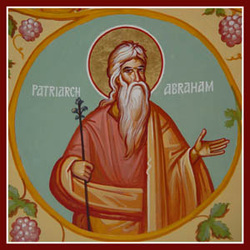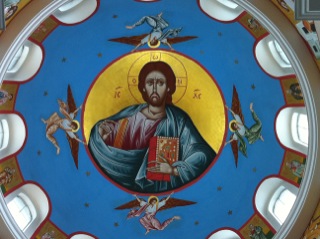
God’s Covenants with His People Israel
From the Orthodox Study Bible (Old Testament)
The Lord had a covenantal relationship with the Israelites whereby He promised to always protect and provide for them as well as rescue them. In return, they agreed to worship and serve only Him, as prescribed. When foreign armies invaded Israel, or when other disasters occurred, the Prophets consistently interpreted such calamities as resulting from the people falling away from their covenantal commitment to the Lord.
The Prophets convey God’s grief and anger when the Hebrews stray from Him (Is 1:1-31; 24:1-12; Am 3:1-6:14). Yet He remains faithful to His covenant, even when His people do not. God even commands the Prophet Hosea to marry a prostitute in order to demonstrate His unfailing fidelity to Israel despite all the times she has played the harlot with other gods (Hos 1:2-3:5; Jdg 2:17).
The Old Testament records several covenants between God and His people. Through these successive, overlapping covenants, God gradually draws all of mankind, through His chosen people, closer to Himself:
1. The covenant with Noah (Gn 9:8-17). God pledges that there will never be another flood like the one which destroyed the previous civilization.
2. The covenant with Abraham (Gn 12:1-3; 15:1-21; 17:1-21; see Ps 104:1-15). God promises to Abraham a great multitude of descendants, who will inherit the land of Canaan and always be His people. Through them, “all the tribes of the earth shall be blessed” (Gn 12:3).
3. The covenant under Moses (Ex 19:1-31:18; 34:1-28; Dt 5:1-30:20). Established by the Lord shortly after He miraculously rescues His people out of Egypt, this covenant provided the lengthy and detailed Mosaic Law to guide the Hebrews in their relations with one another and with Him.
4. The renewal of the Mosaic Covenant under Joshua (Jos 23:1-24:27).
5. The covenant with David (2Kg 7:1-29; 23:1-5; Ps 88:1-37; Is 55:3, 4) and his son Solomon (3Kg 8:1-9:9). This covenant establishes the house of David forever: “His seed shall remain forever, and his throne as the sun before Me” (Ps 88:37). From this promise comes the expectation of a great King and Savior, David’s descendant (Jer 23:5, 6) who will deliver Israel from all her enemies and will rule the earth with righteousness and peace.
The Prophet Ezekiel prophesies a “covenant of peace” inaugurating a future era of peace and prosperity for Israel under the care of “one shepherd . . . My Servant David” (Ezk 34:20-21; see 37:15-28). Jeremiah and Ezekiel envision this “new covenant” (Jer 38:31-34; Ezk 36:22-28) to be based on the spiritual cleansing and renewal of men’s hearts. Isaiah foresees the new, “everlasting covenant” when God will gather all peoples to share in the blessings of Israel (Is 2:1-4; 49:6; 55:5; 60:1-6; see Jer 3:12-17; 4:1, 2; Ps 71:1-19).
The New Testament (or New Covenant), prophesied by Jeremiah, Ezekiel, and Isaiah, is inaugurated on earth by Jesus Christ, the “Son of David” (Mt 21:9-11; Mk 10:46-48), the one Shepherd (Jn 10:1-16, 25-28) who comes to gather all people to Himself in spiritual unity and who sends the Holy Spirit (Jn 15:26) on Pentecost to dwell in His followers. Jesus declares at the Last Supper, “This cup is the new covenant in My blood” (Lk 22:20), thus directly linking this new covenant with a covenant meal-the Eucharist. Calling Christ the “Mediator of a better covenant” (Heb 8:6), the Book of Hebrews dramatically demonstrated how He fulfills and supersedes the old covenant made with the Israelites (3:1-10:22).
In the Church, the New Israel (Gal 6:12-16; see 2Co 3:12-18; Eph 2:11-16; Mt 21:33-46), we all have the opportunity to experience the spiritual joy of the new covenant as a foretaste of the heavenly kingdom (Heb 12:18-24), in which believers from all nations will rejoice with God eternally. Hence, it is very fitting that every Diving Liturgy begins with the proclamation, “Blessed is the Kingdom!”
From the Orthodox Study Bible (Old Testament)
The Lord had a covenantal relationship with the Israelites whereby He promised to always protect and provide for them as well as rescue them. In return, they agreed to worship and serve only Him, as prescribed. When foreign armies invaded Israel, or when other disasters occurred, the Prophets consistently interpreted such calamities as resulting from the people falling away from their covenantal commitment to the Lord.
The Prophets convey God’s grief and anger when the Hebrews stray from Him (Is 1:1-31; 24:1-12; Am 3:1-6:14). Yet He remains faithful to His covenant, even when His people do not. God even commands the Prophet Hosea to marry a prostitute in order to demonstrate His unfailing fidelity to Israel despite all the times she has played the harlot with other gods (Hos 1:2-3:5; Jdg 2:17).
The Old Testament records several covenants between God and His people. Through these successive, overlapping covenants, God gradually draws all of mankind, through His chosen people, closer to Himself:
1. The covenant with Noah (Gn 9:8-17). God pledges that there will never be another flood like the one which destroyed the previous civilization.
2. The covenant with Abraham (Gn 12:1-3; 15:1-21; 17:1-21; see Ps 104:1-15). God promises to Abraham a great multitude of descendants, who will inherit the land of Canaan and always be His people. Through them, “all the tribes of the earth shall be blessed” (Gn 12:3).
3. The covenant under Moses (Ex 19:1-31:18; 34:1-28; Dt 5:1-30:20). Established by the Lord shortly after He miraculously rescues His people out of Egypt, this covenant provided the lengthy and detailed Mosaic Law to guide the Hebrews in their relations with one another and with Him.
4. The renewal of the Mosaic Covenant under Joshua (Jos 23:1-24:27).
5. The covenant with David (2Kg 7:1-29; 23:1-5; Ps 88:1-37; Is 55:3, 4) and his son Solomon (3Kg 8:1-9:9). This covenant establishes the house of David forever: “His seed shall remain forever, and his throne as the sun before Me” (Ps 88:37). From this promise comes the expectation of a great King and Savior, David’s descendant (Jer 23:5, 6) who will deliver Israel from all her enemies and will rule the earth with righteousness and peace.
The Prophet Ezekiel prophesies a “covenant of peace” inaugurating a future era of peace and prosperity for Israel under the care of “one shepherd . . . My Servant David” (Ezk 34:20-21; see 37:15-28). Jeremiah and Ezekiel envision this “new covenant” (Jer 38:31-34; Ezk 36:22-28) to be based on the spiritual cleansing and renewal of men’s hearts. Isaiah foresees the new, “everlasting covenant” when God will gather all peoples to share in the blessings of Israel (Is 2:1-4; 49:6; 55:5; 60:1-6; see Jer 3:12-17; 4:1, 2; Ps 71:1-19).
The New Testament (or New Covenant), prophesied by Jeremiah, Ezekiel, and Isaiah, is inaugurated on earth by Jesus Christ, the “Son of David” (Mt 21:9-11; Mk 10:46-48), the one Shepherd (Jn 10:1-16, 25-28) who comes to gather all people to Himself in spiritual unity and who sends the Holy Spirit (Jn 15:26) on Pentecost to dwell in His followers. Jesus declares at the Last Supper, “This cup is the new covenant in My blood” (Lk 22:20), thus directly linking this new covenant with a covenant meal-the Eucharist. Calling Christ the “Mediator of a better covenant” (Heb 8:6), the Book of Hebrews dramatically demonstrated how He fulfills and supersedes the old covenant made with the Israelites (3:1-10:22).
In the Church, the New Israel (Gal 6:12-16; see 2Co 3:12-18; Eph 2:11-16; Mt 21:33-46), we all have the opportunity to experience the spiritual joy of the new covenant as a foretaste of the heavenly kingdom (Heb 12:18-24), in which believers from all nations will rejoice with God eternally. Hence, it is very fitting that every Diving Liturgy begins with the proclamation, “Blessed is the Kingdom!”
